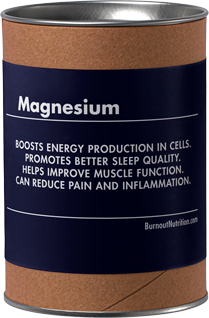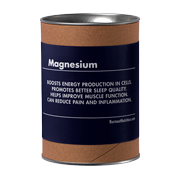Magnesium plays a crucial role in our body’s energy production process. It helps convert food into energy and it also supports enzymes that regulate diverse biochemical reactions in our body, some of which are related to our energy level.
People with Chronic Fatigue Syndrome (CFS) often display low levels of magnesium in their blood. When these individuals take magnesium supplements, they may potentially alleviate symptoms of fatigue, thus improving their energy levels. It is also suggested by some studies that the supplementation of magnesium can improve the sleep quality of people suffering from CFS, thus indirectly enhancing their daily energy levels.
However, it’s important to note that magnesium is not a guaranteed remedy for Chronic Fatigue Syndrome. While it could potentially alleviate some symptoms, individual reactions may vary.

- Boosts energy production in cells.
- Promotes better sleep quality.
- Helps improve muscle function.
- Can reduce pain and inflammation.
- Enhances overall physical performance.
Magnesium: Purchase | Dosage | Benefits | Science
Buy Magnesium online:
Important Note: This information serves as a guideline only and should NOT replace specialist advice. Always consult your doctor, pharmacist or a health care professional like a nutritionist before starting any new treatment.
Magnesium Dosage for Chronic Fatigue
The recommended dosages for Magnesium in the treatment of chronic fatigue syndrome may vary depending on the needs of the individual patient, and these dosages should always be determined in consultation with a healthcare professional. Here are some general recommendations:
- For adults aged 19 years and older (both genders), 320 to 420 mg daily is considered safe by the National Institutes of Health. Hence, a dose in this range may be used for chronic fatigue syndrome, again depending on individual needs.
Pregnant and breastfeeding women may require different dosages, and children are also typically recommended different dosages based on their age and weight.
For magnesium’s role in chronic fatigue syndrome specifically, studies do suggest that oral magnesium citrate supplementation can help. One such study used a dosage of 680 mg of magnesium citrate daily, but more research is needed in this area.
Magnesium Benefits for Chronic Fatigue
- Promotes energy production in cells.
- Improves sleep quality and duration.
- Stabilizes irregular heart rhythms.
- Reduces muscle weakness and aches.
- Enhances cognitive function and mood.
- Elevates Energy Levels: Magnesium is a vital nutrient in the production of cellular energy. Those suffering from chronic fatigue syndrome can benefit from increased energy levels after magnesium intake.
- Improves Sleep Quality: Magnesium can enhance the quality of sleep, one of the common issues faced by people with chronic fatigue. Improved sleep can significantly reduce fatigue levels.
- Reduces Muscle Pain: Magnesium is important for nerve transmission and muscle contraction. Insufficient magnesium can cause muscle fatigue and pain, which is a common symptom in chronic fatigue syndrome. Supplementing with it can help alleviate this symptom.
- Boosts Mental Function: Magnesium deficiency can result in poor cognitive function, including memory loss and trouble focusing. By taking magnesium supplements, those with chronic fatigue syndrome may see improvement in cognitive functions.
- Regulates Mood: Magnesium plays a role in mood regulation and can act as a mild mood stabilizer. This is beneficial for those with chronic fatigue syndrome, who may experience symptoms of anxiety or depression.
Science on Magnesium and Burnout/CFS/ME
Red blood cell magnesium and chronic fatigue syndrome | ⏍
Increase of free Mg2+ in the skeletal muscle of chronic fatigue syndrome patients | ⏍
Natural sources of Magnesium
Good natural sources of Magnesium include:
- Green leafy vegetables
- Nuts and seeds
- Legumes
- Whole grains
- Fish
- Bananas
- Dark chocolate
- Avocados

Our favourite Magnesium brand
We recommend Solgar or Pure Encapsulation brands of Magnesium because they are:
- Reliably high quality
- Readily available
- Relatively inexpensive
- Well reviewed
Forms of Magnesium supplement
We use Pure Encapsulation’s ‘Magnesium Glycinate‘, but there are several forms of magnesium available.
Here’s a brief overview of the most common types:
- Magnesium Citrate: This is one of the most common and easily absorbed forms of magnesium. It’s often used for its laxative effect and to help with constipation, as well as for improving magnesium levels in the body.
- Magnesium Oxide: Often used to relieve digestive issues like heartburn or constipation, magnesium oxide is less bioavailable compared to other forms. It’s also used as a dietary supplement to increase magnesium levels.
- Magnesium Chloride: Easily absorbed by the body, magnesium chloride can be used both orally and topically. It’s believed to help with kidney function and improving magnesium levels in the body.
- Magnesium Lactate: This form of magnesium is often recommended for people with digestive issues as it is less likely to cause diarrhea. It’s used to treat magnesium deficiency and is gentler on the stomach.
- Magnesium Malate: Known for its high bioavailability, magnesium malate is often used for muscle pain and fibromyalgia. It’s also beneficial for energy production as malate (malic acid) plays a key role in the Krebs cycle.
- Magnesium Taurate: This type is a combination of magnesium and taurine, an amino acid. It’s often recommended for heart health and to support cardiovascular function.
- Magnesium Glycinate: Highly bioavailable and less likely to cause laxative effects, magnesium glycinate is often used to reduce muscle pain, improve sleep, and manage stress and anxiety.
- Magnesium Threonate: Known for its ability to penetrate the blood-brain barrier, magnesium threonate is often used for cognitive functions, including improving memory and brain function.
- Magnesium Sulfate: Commonly known as Epsom salt, it is used in bath soaks to relieve muscle soreness and stress. However, its effectiveness as an oral supplement is less clear.
- Magnesium Carbonate: This form has antacid properties and is used to treat indigestion, heartburn, and upset stomach. When ingested, it forms magnesium chloride in the stomach.
- Magnesium Orotate: This contains orotic acid and is believed to support heart health. It’s used for improving athletic performance and heart health.





